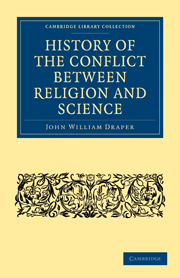Book contents
- Frontmatter
- Preface
- Contents
- CHAPTER I THE ORIGIN OF SCIENCE
- CHAPTER II THE ORIGIN OF CHRISTIANITY.—ITS TRANSFORMATION ON ATTAINING IMPERIAL POWER.—ITS RELATIONS TO SCIENCE
- CHAPTER III CONFLICT RESPECTING THE DOCTRINE OF THE UNITY OF GOD.—THE FIRST OR SOUTHERN REFORMATION
- CHAPTER IV THE RESTORATION OF SCIENCE IN THE SOUTH
- CHAPTER V CONFLICT RESPECTING THE NATURE OF THE SOUL.—DOCTRINE OF EMANATION AND ABSORPTION
- CHAPTER VI CONFLICT RESPECTING THE NATURE OF THE WORLD
- CHAPTER VII CONTROVERSY RESPECTING THE AGE OF THE EARTH
- CHAPTER VIII CONFLICT RESPECTING THE CRITERION OF TRUTH
- CHAPTER IX CONTROVERSY RESPECTING THE GOVERNMENT OF THE UNIVERSE
- CHAPTER X LATIN CHRISTIANITY IN RELATION TO MODERN CIVILIZATION
- CHAPTER XI SCIENCE IN RELATION TO MODERN CIVILIZATION
- CHAPTER XII THE IMPENDING CRISIS
- INDEX
CHAPTER VIII - CONFLICT RESPECTING THE CRITERION OF TRUTH
Published online by Cambridge University Press: 29 August 2010
- Frontmatter
- Preface
- Contents
- CHAPTER I THE ORIGIN OF SCIENCE
- CHAPTER II THE ORIGIN OF CHRISTIANITY.—ITS TRANSFORMATION ON ATTAINING IMPERIAL POWER.—ITS RELATIONS TO SCIENCE
- CHAPTER III CONFLICT RESPECTING THE DOCTRINE OF THE UNITY OF GOD.—THE FIRST OR SOUTHERN REFORMATION
- CHAPTER IV THE RESTORATION OF SCIENCE IN THE SOUTH
- CHAPTER V CONFLICT RESPECTING THE NATURE OF THE SOUL.—DOCTRINE OF EMANATION AND ABSORPTION
- CHAPTER VI CONFLICT RESPECTING THE NATURE OF THE WORLD
- CHAPTER VII CONTROVERSY RESPECTING THE AGE OF THE EARTH
- CHAPTER VIII CONFLICT RESPECTING THE CRITERION OF TRUTH
- CHAPTER IX CONTROVERSY RESPECTING THE GOVERNMENT OF THE UNIVERSE
- CHAPTER X LATIN CHRISTIANITY IN RELATION TO MODERN CIVILIZATION
- CHAPTER XI SCIENCE IN RELATION TO MODERN CIVILIZATION
- CHAPTER XII THE IMPENDING CRISIS
- INDEX
Summary
Ancient philosophy declares that man has no means of ascertaining the truth.
Differences of belief arise among the early Christians.—An ineffectual attempt is made to remedy them by Councils.—Miracle and ordeal proof introduced.
The papacy resorts to auricular confession and the Inquisition.—It perpetrates frightful atrocities for the suppression of differences of opinion.
Effect of the discovery of the Pandects of Justinian and development of the canon law on the nature of evidence.—It becomes more scientific.
The Reformation establishes the rights of individual reason.—Catholicism asserts that the criterion of truth is in the Church. It restrains the reading of books by the Index Expurgatorius, and combats dissent by such means as the massacre of St. Bartholomew's Eve.
Examination of the authenticity of the Pentateuch as the Protestant criterion.—Spurious character of those books.
For Science the criterion of truth is to be found in the revelations of Nature : for the Protestant, it is in the Scriptures ; for the Catholic, in an infallible Pope.
“What is truth?” was the passionate demand of a Roman procurator on one of the most momentous occasions in history. And the Divine Person who stood before him, to whom the interrogation was addressed, made no reply—unless, indeed, silence contained the reply.
Often and vainly had that demand been made before—often and vainly has it been made since. No one has yet given a satisfactory answer.
- Type
- Chapter
- Information
- History of the Conflict between Religion and Science , pp. 201 - 227Publisher: Cambridge University PressPrint publication year: 2009First published in: 1875



